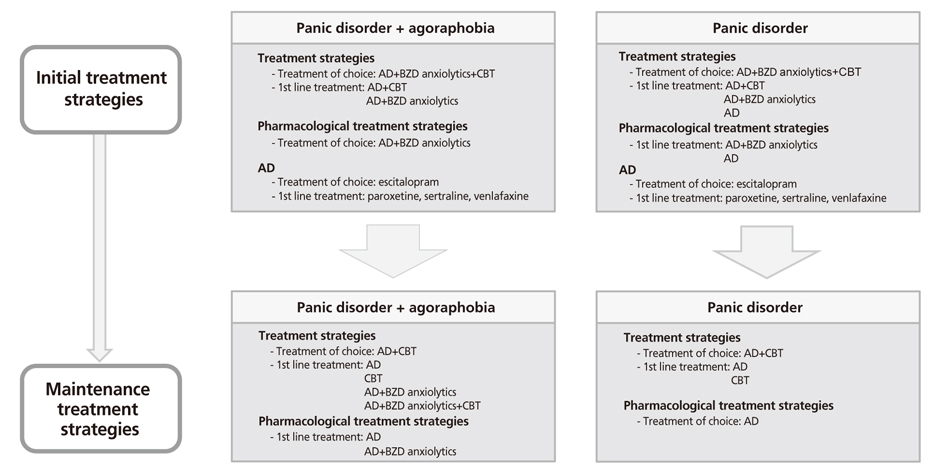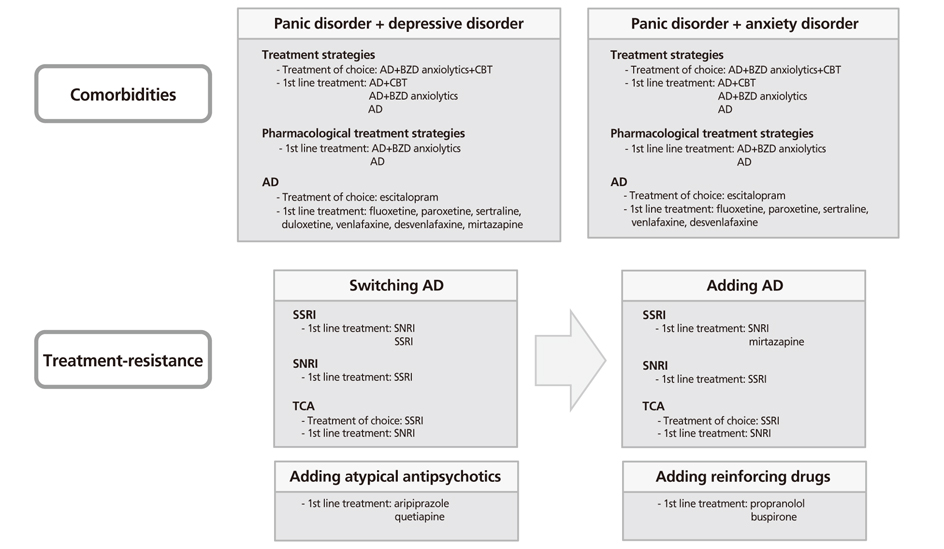J Korean Med Assoc.
2018 Aug;61(8):493-499. 10.5124/jkma.2018.61.8.493.
Korean guidelines for the treatment of panic disorder
- Affiliations
-
- 1Department of Psychiatry, CHA University School of Medicine, Seoul, Korea. mkkim0212@gmail.com
- 2Department of Psychiatry, Korea University College of Medicine, Seoul, Korea.
- 3Department of Psychiatry, Inje University College of Medicine, Seoul, Korea.
- KMID: 2428824
- DOI: http://doi.org/10.5124/jkma.2018.61.8.493
Abstract
- The Korean Association of Anxiety Disorders developed a Korean guideline for the treatment of panic disorders in 2018 to help clinicians make treatment decisions. This study investigated the consensus about treatment strategies for initial and maintenance treatment, non-responsive cases, comorbid conditions, and psychotherapy in patients with panic disorder. The executive committee developed questionnaires about treatment strategies for patients with panic disorder based on guidelines, algorithms, and clinical trials previously published in foreign countries and Korea. Seventy-two 61% of 112 experts on a committee reviewing panic disorders responded to the questionnaires. We classified the consensus of expert opinions into 3 categories (first-line, second-line, and third-line treatment strategies) and identified the treatment of choice according using the chi-square test and 95% confidence intervals. This study presents useful information about the consensus among Korean experts regarding pharmacotherapy and cognitive behavior therapy for patients with panic disorder.
Keyword
MeSH Terms
Figure
Cited by 1 articles
-
The Bodily Panic Symptoms and Predisposing Stressors in Korean Patients with Panic Disorder
Hyun-Joo Lee, Min-Sook Gim, Se Joo Kim, Seon-Cheol Park, Jong-Chul Yang, Kyoung-Uk Lee, Sang-Hyuk Lee, Seung-Jae Lee, Se-Won Lim, Jeong-Ho Chae, Sang-Woo Han, Jin Pyo Hong, Ho-Jun Seo
J Korean Neuropsychiatr Assoc. 2019;58(4):339-345. doi: 10.4306/jknpa.2019.58.4.339.
Reference
-
1. Executive Committee for Korean Medication Algorithm for Panic Disorder. Korean medication algorithm project for panic disorder 2008. Seoul: ML Communication;2008.2. Development Committee for Korean Guidelines for Panic Disorder. Korean guidelines for the treatment of panic disorder 2018. Seoul: Eims International;2018.3. American Psychiatric Association. Practice guideline for the treatment of patients with panic disorder [Internet]. Washington, DC: American Psychiatric Association;2009. cited 2018 Jul 29. Available from: https://psychiatryonline.org/pb/assets/raw/sitewide/practice_guidelines/guidelines/panicdisorder.pdf.4. National Institute for Health and Care Excellence. Generalised anxiety disorder and panic disorder in adults: management [Internet]. London: National Institute for Health and Care Excellence;2011. cited 2018 Jul 29. Available from: https://www.nice.org.uk/guidance/cg113.5. National Institute for Health and Care Excellence. Panic disorder overview [Internet]. London: National Institute for Health and Care Excellence;2016. cited 2018 Jul 29. Available from: https://pathways.nice.org.uk/pathways/panic-disorder.6. Katzman MA, Bleau P, Blier P, Chokka P, Kjernisted K, Van Ameringen M, Antony MM, Bouchard S, Brunet A, Flament M, Grigoriadis S, Mendlowitz S, O'Connor K, Rabheru K, Richter PM, Robichaud M, Walker JR. Canadian Anxiety Guidelines Initiative Group on behalf of the Anxiety Disorders Association of Canada/Association Canadienne des troubles anxieux and McGill University. Canadian clinical practice guidelines for the management of anxiety, posttraumatic stress and obsessive-compulsive disorders. BMC Psychiatry. 2014; 14:Suppl 1. S1.
Article7. Baldwin DS, Anderson IM, Nutt DJ, Allgulander C, Bandelow B, den Boer JA, Christmas DM, Davies S, Fineberg N, Lidbetter N, Malizia A, McCrone P, Nabarro D, O'Neill C, Scott J, van der Wee N, Wittchen HU. Evidence-based pharmacological treatment of anxiety disorders, post-traumatic stress disorder and obsessive-compulsive disorder: a revision of the 2005 guidelines from the British Association for Psychopharmacology. J Psychopharmacol. 2014; 28:403–439.
Article



